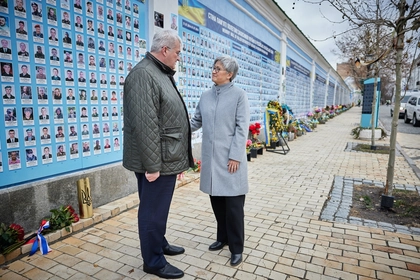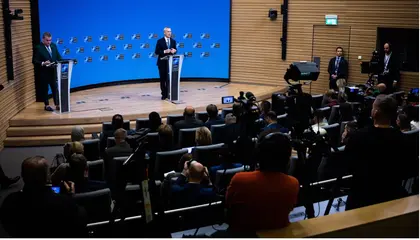Speaking the day before a foreign minister-level meeting at NATO headquarters, the Secretary-General welcomed Ukraine’s Minister of Foreign Affairs, marking the first time a representative of the country was present at such a high-level engagement in the Alliance.
At the traditional pre-ministerial press conference on Monday, Jens Stoltenberg told reporters ahead of the Foreign Ministers meeting that it will see the first meeting on Wednesday of the NATO-Ukraine Council at the level of foreign ministers at which the Ukrainian Foreign Minister, Dmytro Kuleba, will represent Ukraine.
JOIN US ON TELEGRAM
Follow our coverage of the war on the @Kyivpost_official.
He underlined that NATO was implementing the decision on Ukraine’s membership made at the NATO Vilnius Summit as a signal to Kyiv and others. “We will reaffirm NATO’s long-term support and agree on recommendations for Ukraine’s priority reforms, as we continue to support Kyiv on its path to NATO membership,” Stoltenberg said.
He also called for the pause in fighting in Gaza to be extended to “allow for much-needed relief to the people of Gaza and the release of more hostages.” He also called on Iran to “rein in its proxies” that were responsible for attacks against US forces in Iraq and Syria.
Turning to Russia, Stoltenberg warned that Moscow was still attempting to destabilize Allied democracies, through the use of cyber-attacks and energy blackmail, as well as the cynical use of migrants at Finland’s border with Russia as a “tool to put pressure on a neighbor and a NATO Ally.”

Australian Foreign Minister Visits Kyiv, Confirms Reopening of Embassy
In terms of the progress of Ukraine’s offensive, Stoltenberg said that Kyiv was “inflicting major losses on Russia,” has liberated 50 percent of the territory that Russia had seized in February 2022, and continues to prevail “as a sovereign independent nation.” He added that Russia is now “weaker politically, economically and militarily” than before the war.
Stoltenberg said that NATO was considering a permanent increase in the number of peacekeeping troops in the Western Balkans. “Stability depends on all sides choosing dialogue and diplomacy over conflict and chaos,” he added.
Other issues to be addressed included a call for Turkey and Hungary to agree on the ratification of Sweden’s membership of NATO and the challenges posed by China. He said, “China is not an adversary, but Beijing’s actions challenge our security, and we must work together to respond.”
You can also highlight the text and press Ctrl + Enter






